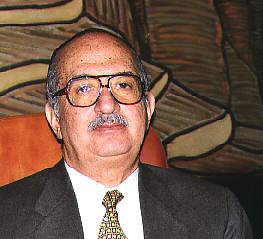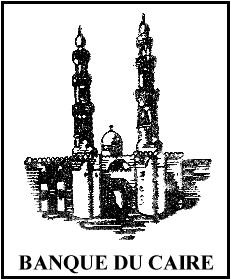
|


Read our exclusive interview
|

 BANQUE DU CAIRE
BANQUE DU CAIRE
"Your Honest Consultant in Egypt"
Manager:
MOHAMED ABO EL FATH, Chairman
Contact:
22 Adly Str.
Cairo
Egypt
Tel. (20) 2 390.4554 / 390.7131 / 395.3415
Fax: (20) 2 390.8992
|

 Strategy Strategy
 Company Profile Company Profile
BDC , Banque Du Caire, has the most extensive international network of an Egyptian Government owned bank with :
5 branches in the Gulf Area
3 joint-ventures with :
- Cairo International Bank, Kampala – Uganda
- Cairo Amman Bank – Jordan
- United Saudi Bank – Saudi Arabia
2 Representation offices :
- Kiev, Ukraine
- Harare, Zimbabwe
BDC participates in B.O.T. and B.O.O.T. projects and financial leasing within the framework of non-traditional services
* BDC achieved the highest return on equity among the public sector banks
* BDC provide4s ATM services in addition to its flexible and wide range ones
In Improving the quality of it services BDC achieved a tangible growth as evidence by its 1997/1998 following figures :
|
Million E.P. |
Growth Rate |
|
1998 |
1997 |
|
| Total Assets |
31,875 |
28,548 |
11% |
| Deposits |
29,029 |
25,810 |
12,5% |
| Capital |
750 |
750 |
00% |
| Net Profit |
130 |
104 |
25% |
 INTERVIEW WITH INTERVIEW WITH
MR. MOHAMED ABO EL-FATH
CHAIRMAN OF BANQUE DU CAIRE
Sunday 20th December 1998
1/Q: Mr. El Fath, could you give our readers a brief historical background and the structure of BDC?
The name of the bank is in French because it is registered in French. The bank was established on 15th May 1952 as a private bank. It started at a critical time because less than two months after, on the 23rd of July, the revolution took place. The bank was owned by very wealthy families that were sometimes examined by the government of the revolution. Despite that fact, the bank realized profit after the first year and started to open branches in all other areas, such as Lebanon, Syria, and Saudi Arabia. Afterwards we opened in the United Arab Emirates. The bank expanded very rapidly. When the banks were nationalized in 1957, after the 1956 war, we took all French Banks (Credit Lyonnais, etc…) and merged them into Banque Du Caire, in addition to Credit Orient in 1964. In 1961 we then became entirely owned by the government. Since then BDC has gained gross profit between L.E. 50 million and L.E. 100 million. Last year we are reaching between L.E. 900 million and L.E.
1 billion in gross profit. As a result of the revolutions and the nationalization that took place in the Arab countries, we lost all our branches there. We had 5 or 6 branches in Syria that were taken by the Syrian government. In Lebanon we merged with Banque Misr. In Saudi Arabia the branches were nationalized. We have Saudi Cairo Bank. It has recently been bought by Saudi United Bank. We own only 10%. We still have BDC in Jordan. It is called Cairo Amman Bank. We own 12% of that bank. In Addition, we have our own 5 branches in the UAE and Bahrain. We have representative offices in the Ukraine and Zimbabwe. We also have a joint venture in Uganda. It is called Cairo International Bank. We started it three years ago. We have more than 250 branches and units in Egypt. We are one of the four big public sector banks in Egypt. We rank third after the National Bank of Egypt and Banque Misr. According to some international ratios, at certain times, we even rank first.
2/Q: What makes you and your bank so special, in other words, what makes you differ from other bank(er)s?
We are completely a commercial bank. In the 70s there were some classification between banks. At the time we were concerned with transportation and tourism. Today, there are no specifications.
3/Q: Would you say that Egypt enjoys a well-developed and well-operating banking system? If "yes" give your reasons, if "no" what else should be done in that sector?
Yes, absolutely. All the banks are now fully computerized. We are known internationally. We have already financed the famous second mobile network, MisrFone or Click GSM. It was financed by BDC and Banque Misr and it is one of our biggest investments. They started to make a bridge finance from Barclays bank in London. BDC participated in this loan. It was almost $200 million. We have a lot of big projects here like the Nile Sat, hotels..etc. We are a very friendly bank.
4/Q: Foreign brokers are publishing glowing reports about the Government’s strong commitment to economic reform and privatization. What is your opinion?
Privatization started in 1991. It was the only good thing that has been done by the government to start putting the economy on the right track. Without the big four banks, this could not have succeeded because we supported the policy and we adopted it. Therefore, we are gaining now from that policy. I am very confident.
|
5/Q: The Egyptian financial sector is still dominated by state-owned banks (70% of business is done by the big 4 banks) but there are plans for all of them to be privatized. Who, from your point of view, would be the best investors in Egyptian banks and on the other hand would those "best buyers" be interested in privatization of Egyptian banks?
The big four banks will be privatized very conservatively. Capital will be increased by 10% for one of the banks (either BDC or Bank of Alexandria) and it will be divided among small investors. We will never permit to have one single major investor. It will come very slowly and very conservatively. We still do not have information about the privatization of the big four banks. We have a joint venture with Barclays bank. We are going to sell to Barclays Bank 11% of the bank.
6/Q: Which is the toughest problem of Egyptian banks : lack of good management, bad performance of real sector, dependence on authorities or something else?
We have the expertise, we have the money, and the branches. We can be affected by recession and problems like in Russia or Wall Street but we can be affected differently. But for banks, we do not have problems. Obviously we are affected by the financial turmoil in other countries as the world is a small village.
7/Q: What new financial services do you expect to offer in the near future?
We have already done a lot in the last two years. We have introduced the ATM machines all over Cairo, home-banking credit cards. The competition here is very severe but we (the governmental banks) are competitive. We have huge capital compared to the private banks. The small banks can only compete in very limited areas.
8/Q: What do you think about the government’s plan to diversify the bond market, which is another investment vehicle and source of potential finance?
At BDC we already issue bonds for our customers, adding our guarantee to them. We issued bonds for L.E. 250 million, $ 80 million. It was covered about 2.6 times. There is a quarrel between the banks to collect it. We are in the process of issuing 400 in a week and after that we will issue another 500 in February. We are adapting this since we offer very good security. The government itself is issuing bonds but the rate of interest, however, started at 12%. Now, it is 10%. At BDC we issue bonds at 11% to our customers. This is very agreeable and it proved to be very successful. We are the only bank among the big four banks that started to do this. We guarantee those bonds and they are governmental in a way because we are a government bank.
- Are you planning to diversify the types of bond that you offer?
No. We started now with one kind of bonds. Diversification will come later in the future.
9/Q: In the last few years the government has adopted a liberal attitude. What should the government do to go one step forward?
The government should sell the shares when they privatize a company just to gain more confidence with the people. The government should put fair prices and not high prices. For example if a company share is worth L.E. 20 the government should put it at L.E. 18 just to make people come and buy. Our stock market is hit by what happened all over the world. As an emerging market, we want to invest and make capital gains. We are still an emerging market
10/Q: Do you have any relationships with companies in the USA or are you trying to increase relations with American companies or investors?
The government is encouraging foreign investments. We need this money not just in the stock market that would stay for a month, we need investments that will stay in the country. We need investments like the BOT that will build factories. Banque Du Caire started one in a power plant at Sidi Kraire. A lot of companies come here like the mobile companies.
11/Q: Could you give our readers your own personal background?
I graduated from the Faculty of Commerce in 1955. I have several diplomas from all over the world because at the time I was working in the foreign department at BDC. I joined BDC as soon as I graduated. The bank was established in 1952 and I started working there in October 1955. I have attended a lot of seminars all over the world. I worked in Saudi Arabia as the manager of one of our branches for almost 10 years and then returned to Cairo as the general manager. Then, I went to Cairo Barclays as the joint-managing director. Now, I am the Chairman of the two banks. I am married with a son and a daughter.
12/Q: What has been your most satisfying personal achievement since you have been appointed Chairman?
For both banks, I believe that my most satisfying achievement is to fully computerize Banque Du Caire. I spent more than L.E. 200 million on that. All the branches from Aswan to Alexandria are computerized. They are more than 200 branches for almost 10 years and a connection with our branches, mainly in the Gulf area, has also been established. I implemented a policy for those who want to be taught the English Language as well, because not all of the BDC staff can speak English. I think between 6000 and 7000 of our staff are being trained to speak English.
13/Q: What will your final message to our readers be?
Egypt is a very safe country. We are very friendly. We like them to visit us. We also like them to come and invest their money here. They will never lose. |
© World INvestment NEws, 1998.
This is the electronic edition of the special country report on Egypt published in FORBES Magazine,
May 31st issue.
Developed by AgenciaE.Tv |
|
|
|
|
|
|
|
|
|
|

